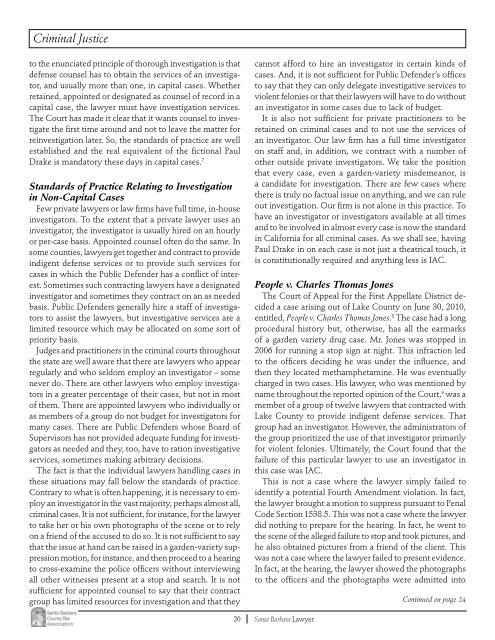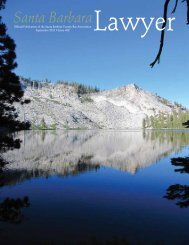¡Viva La Fiesta! - Santa Barbara County Bar Association
¡Viva La Fiesta! - Santa Barbara County Bar Association
¡Viva La Fiesta! - Santa Barbara County Bar Association
Create successful ePaper yourself
Turn your PDF publications into a flip-book with our unique Google optimized e-Paper software.
Criminal Justice<br />
to the enunciated principle of thorough investigation is that<br />
defense counsel has to obtain the services of an investigator,<br />
and usually more than one, in capital cases. Whether<br />
retained, appointed or designated as counsel of record in a<br />
capital case, the lawyer must have investigation services.<br />
The Court has made it clear that it wants counsel to investigate<br />
the first time around and not to leave the matter for<br />
reinvestigation later. So, the standards of practice are well<br />
established and the real equivalent of the fictional Paul<br />
Drake is mandatory these days in capital cases. 7<br />
Standards of Practice Relating to Investigation<br />
in Non-Capital Cases<br />
Few private lawyers or law firms have full time, in-house<br />
investigators. To the extent that a private lawyer uses an<br />
investigator, the investigator is usually hired on an hourly<br />
or per-case basis. Appointed counsel often do the same. In<br />
some counties, lawyers get together and contract to provide<br />
indigent defense services or to provide such services for<br />
cases in which the Public Defender has a conflict of interest.<br />
Sometimes such contracting lawyers have a designated<br />
investigator and sometimes they contract on an as needed<br />
basis. Public Defenders generally hire a staff of investigators<br />
to assist the lawyers, but investigative services are a<br />
limited resource which may be allocated on some sort of<br />
priority basis.<br />
Judges and practitioners in the criminal courts throughout<br />
the state are well aware that there are lawyers who appear<br />
regularly and who seldom employ an investigator – some<br />
never do. There are other lawyers who employ investigators<br />
in a greater percentage of their cases, but not in most<br />
of them. There are appointed lawyers who individually or<br />
as members of a group do not budget for investigators for<br />
many cases. There are Public Defenders whose Board of<br />
Supervisors has not provided adequate funding for investigators<br />
as needed and they, too, have to ration investigative<br />
services, sometimes making arbitrary decisions.<br />
The fact is that the individual lawyers handling cases in<br />
these situations may fall below the standards of practice.<br />
Contrary to what is often happening, it is necessary to employ<br />
an investigator in the vast majority, perhaps almost all,<br />
criminal cases. It is not sufficient, for instance, for the lawyer<br />
to take her or his own photographs of the scene or to rely<br />
on a friend of the accused to do so. It is not sufficient to say<br />
that the issue at hand can be raised in a garden-variety suppression<br />
motion, for instance, and then proceed to a hearing<br />
to cross-examine the police officers without interviewing<br />
all other witnesses present at a stop and search. It is not<br />
sufficient for appointed counsel to say that their contract<br />
group has limited resources for investigation and that they<br />
cannot afford to hire an investigator in certain kinds of<br />
cases. And, it is not sufficient for Public Defender’s offices<br />
to say that they can only delegate investigative services to<br />
violent felonies or that their lawyers will have to do without<br />
an investigator in some cases due to lack of budget.<br />
It is also not sufficient for private practitioners to be<br />
retained on criminal cases and to not use the services of<br />
an investigator. Our law firm has a full time investigator<br />
on staff and, in addition, we contract with a number of<br />
other outside private investigators. We take the position<br />
that every case, even a garden-variety misdemeanor, is<br />
a candidate for investigation. There are few cases where<br />
there is truly no factual issue on anything, and we can rule<br />
out investigation. Our firm is not alone in this practice. To<br />
have an investigator or investigators available at all times<br />
and to be involved in almost every case is now the standard<br />
in California for all criminal cases. As we shall see, having<br />
Paul Drake in on each case is not just a theatrical touch, it<br />
is constitutionally required and anything less is IAC.<br />
People v. Charles Thomas Jones<br />
The Court of Appeal for the First Appellate District decided<br />
a case arising out of <strong>La</strong>ke <strong>County</strong> on June 30, 2010,<br />
entitled, People v. Charles Thomas Jones. 8 The case had a long<br />
procedural history but, otherwise, has all the earmarks<br />
of a garden variety drug case. Mr. Jones was stopped in<br />
2006 for running a stop sign at night. This infraction led<br />
to the officers deciding he was under the influence, and<br />
then they located methamphetamine. He was eventually<br />
charged in two cases. His lawyer, who was mentioned by<br />
name throughout the reported opinion of the Court, 9 was a<br />
member of a group of twelve lawyers that contracted with<br />
<strong>La</strong>ke <strong>County</strong> to provide indigent defense services. That<br />
group had an investigator. However, the administrators of<br />
the group prioritized the use of that investigator primarily<br />
for violent felonies. Ultimately, the Court found that the<br />
failure of this particular lawyer to use an investigator in<br />
this case was IAC.<br />
This is not a case where the lawyer simply failed to<br />
identify a potential Fourth Amendment violation. In fact,<br />
the lawyer brought a motion to suppress pursuant to Penal<br />
Code Section 1538.5. This was not a case where the lawyer<br />
did nothing to prepare for the hearing. In fact, he went to<br />
the scene of the alleged failure to stop and took pictures, and<br />
he also obtained pictures from a friend of the client. This<br />
was not a case where the lawyer failed to present evidence.<br />
In fact, at the hearing, the lawyer showed the photographs<br />
to the officers and the photographs were admitted into<br />
20 <strong>Santa</strong> <strong><strong>Bar</strong>bara</strong> <strong>La</strong>wyer<br />
Continued on page 24





